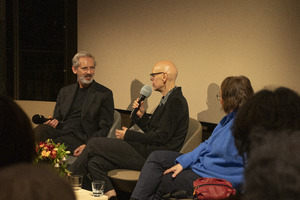Vom Nutzen der Kunst

Vom Nutzen der Kunst
Constanze Fischbeck; Alistair Hudson; Helga Huskamp
| Titel |
|
| Titel (en) |
|
| Autor/in | |
| Schlagworte | |
| Beschreibung |
|
| Beschreibung (en) |
|
2 Inhalte
- Seite 1 von 1
Handeln mit Zwecken. Künste im 21. Jahrhundert
- Titel
- Handeln mit Zwecken. Künste im 21. Jahrhundert
- Titel (en)
- On the benefits of art - with philosopher and artist Judith Siegmund ZKM & HfG Talk Series
- Untertitel
- mit Philosophin und Künstlerin Judith Siegmund ZKM & HfG Gesprächsreihe
- Autor/in
- Beschreibung (de)
- In der gemeinsamen Gesprächsreihe "Vom Nutzen der Kunst" von ZKM und HfG, laden wir internationale Gäste aus Philosophie, Literatur und Kunst zum offenen Austausch mit den Hochschulangehörigen, den Mitarbeitenden des ZKM und der Karlsruher Bevölkerung ein. Zum Auftakt sprechen Alistair Hudson und Constanze Fischbeck mit der Philosophin und Künstlerin Judith Siegmund.
Der Titel des Vortrags an diesem Abend wird sein: "Handeln mit Zwecken. Künste im 21. Jahrhundert“
- In der gemeinsamen Gesprächsreihe "Vom Nutzen der Kunst" von ZKM und HfG, laden wir internationale Gäste aus Philosophie, Literatur und Kunst zum offenen Austausch mit den Hochschulangehörigen, den Mitarbeitenden des ZKM und der Karlsruher Bevölkerung ein. Zum Auftakt sprechen Alistair Hudson und Constanze Fischbeck mit der Philosophin und Künstlerin Judith Siegmund.
- Beschreibung (en)
- In the joint series of talks between ZKM and HfG, we invite international guests from the fields of philosophy, literature and art to an open exchange with members of the university, ZKM staff and the people of Karlsruhe. To kick things off, Alistair Hudson and Constanze Fischbeck will be talking with the philosopher and artist Judith Siegmund.
Judith Siegmund is a professor of philosophical aesthetics at the Zurich University of the Arts. In her book »Zweck und Zweckfreiheit« (2019), she questions the demand for purposelessness in artistic creation that emerged in 20th-century aesthetic theory with reference to Kant. Instead, she starts from the assumption that aesthetic theory must prove adequate to its object.
- In the joint series of talks between ZKM and HfG, we invite international guests from the fields of philosophy, literature and art to an open exchange with members of the university, ZKM staff and the people of Karlsruhe. To kick things off, Alistair Hudson and Constanze Fischbeck will be talking with the philosopher and artist Judith Siegmund.
- Typ des Projekts/Werks
- Schlagworte
- Datierung
- 16.11.2023
- Mitwirkende
- Ort: Institution
- Ort
- ZKM Medialounge
- Stadt
- Land
- Beteiligte Institution(en)
- Internetlinks
- Titel
- Handeln mit Zwecken. Künste im 21. Jahrhundert
- Importiert am
- 23.11.2023
- Übergeordnete Sets
- 1
- Set enthält
- 0 18
An atmosphere of usership
- Titel
- An atmosphere of usership
- Untertitel
- Vom Nutzen der Kunst
- Autor/in
- Beschreibung (de)
- Experts loathe them, spectators oppose them, owners belittle them, yet users abide… though not by the rules. Users and the use that they make — which together we refer to as usership — form a kind of atmosphere, in both the most literal and most figurative sense. Unlike ownership, usership is not a fiction bolstered and legitimated by institutions, but a collective subjectivity comprised of all the agents — human and other-than-human — who make use of a given territory or environment, ensuring the oxygen exchange of the atmosphere. Indeed, as users they are the artisans of that environment, the landscapers and artists of the atmosphere that sustains it. What would it mean, though, for public institutions to foster an atmosphere of usership?
- Beschreibung (en)
- Experts loathe them, spectators oppose them, owners belittle them, yet users abide… though not by the rules. Users and the use that they make — which together we refer to as usership — form a kind of atmosphere, in both the most literal and most figurative sense. Unlike ownership, usership is not a fiction bolstered and legitimated by institutions, but a collective subjectivity comprised of all the agents — human and other-than-human — who make use of a given territory or environment, ensuring the oxygen exchange of the atmosphere. Indeed, as users they are the artisans of that environment, the landscapers and artists of the atmosphere that sustains it. What would it mean, though, for public institutions to foster an atmosphere of usership?
- Typ des Projekts/Werks
- Schlagworte
- Datierung
- 08.02.2024
- Ort: Institution
- Ort
- Medialonge
- Stadt
- Land
- Internetlinks
- Titel
- An atmosphere of usership
- Importiert am
- 20.02.2024
- Übergeordnete Sets
- 1
- Set enthält
- 0 0